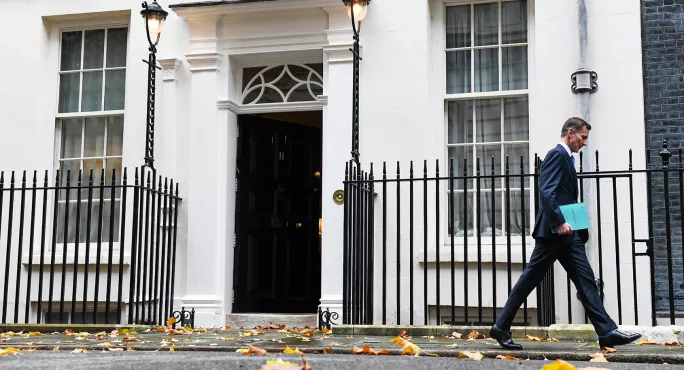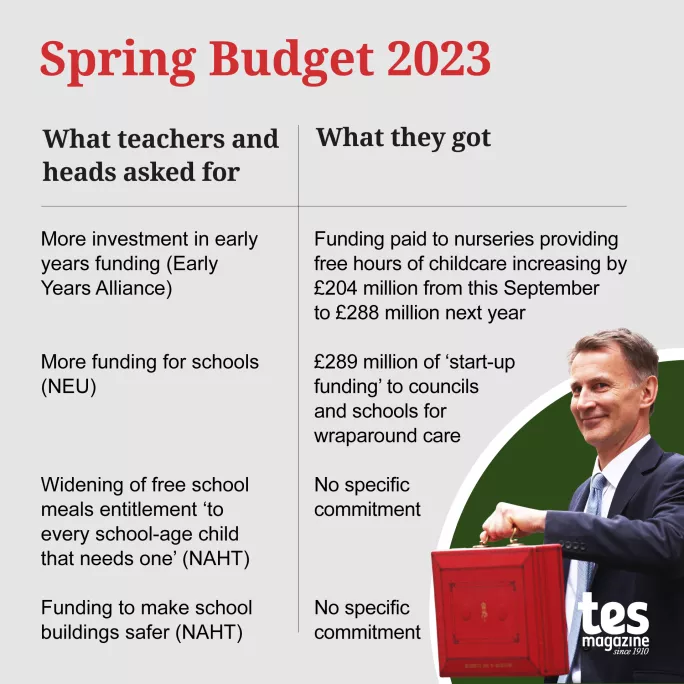Budget 2023: All primaries to provide ‘wraparound’ care

The government has set out an “ambition” that the parents of all primary-age children will be provided with “wraparound” childcare in school by September 2026.
In today’s Budget, chancellor Jeremy Hunt said that the Treasury would fund schools and local authorities to “increase supply of wraparound care so all parents [of school-age children] can drop their children off between 8am and 6pm”.
Mr Hunt said that one in three primary schools did not offer childcare at both ends of the school day, and that he wanted all schools to do this “either on their own or in partnership with other schools” by September 2026.
The Treasury’s Budget document clarifies that the ambition is for “all parents of primary-age children” to be able to access care in school, and that the government will provide £289 million of start-up funding to councils and schools for this.
It added there would be a “national rollout” over 2024-25 and 2025-26.
- Hunt: Schools to get extra £4.6bn over 2 years
- Background: Teacher pay must go up if education is a priority, chancellor told
- Sam Freedman: School budget boost a welcome surprise - but it’s no panacea
The Treasury told Tes that funding would be provided to local authorities and schools and would taper until 2026 - which it is calling the “pathfinder” period.
From 2026, it said it expected that most schools would be able to deliver provision self-sufficiently, funded by charging parents.
Paul Whiteman, general secretary of school leaders’ union the NAHT, called the plan a “half-baked scheme” and stressed the 2026 delivery date.
“Once again, we are left with the feeling that this government is detached from the reality of what is actually going on in our schools,” he added.
Concern over early years ‘pressures’
Also reacting to the Budget, Emma Knights, chief executive of the National Governance Association, said that the wraparound childcare commitment was “welcome” but added that “there are many other services children, families and communities need”.
She said: “NGA is extremely disappointed the chancellor has failed today to invest further in England’s schools. The chancellor’s fourth E of education should more rightly have been called ‘early education’. While investment in childcare is long overdue and very welcome, it does not tackle the pressures on schools being felt by their leaders and their governing boards.”
Geoff Barton, general secretary of the Association of School and College Leaders (ASCL), also bemoaned the lack of extra funding for schools, saying: “Today, we heard the chancellor announce £11 billion for defence and not a penny to address the teacher recruitment and retention crisis affecting our schools and colleges, or resolve the associated industrial action that is taking place as the chancellor was speaking.”
He added that ASCL welcomed the investment in childcare and would ”look closely at the detail”.
Last year, Labour announced that it would offer fully funded breakfast clubs at all English primary schools if it won the next general election.
Shadow education secretary Bridget Phillipson said it would be the “first step on the road to a modern childcare system”.
The party had said the policy would cost £365 million.
And speaking at the ASCL conference last week, Ms Phillipson said a Labour government would “drive forward reform of education and of childcare as part of our mission to break down barriers to opportunity”.
Currently, all families of three- and four-year-olds qualify for 15 hours of free childcare a week over 38 weeks.
Households can qualify for 30 hours of free childcare a week if parents work the equivalent of 16 hours a week at the national minimum or living wage and individually earn less than £100,000.
Earlier this week, before the Budget, figures from a survey showed that only 3 per cent of early years settings, including maintained nurseries, said they would be able to continue providing their current level of services or places.
‘Missed opportunity’ to help schools with energy costs
The government announced further support for household energy bills - with the Energy Price Guarantee cap on bills being extended to June - but there were no changes to the reductions planned for schools.
The Energy Bill Relief Scheme for non-domestic customers - including schools - runs until this month when it is due to be replaced by a less generous support system.
Confederation of School Trusts chief executive Leora Cruddas called the lack of extra support “a missed opportunity to support public sector services to manage energy-related cost pressures”.
“We are pleased to note the announcement about wraparound childcare, which may have a positive impact on the education workforce”, she added.
Pay settlements ‘must not fuel inflation’
Mr Hunt also referred to the current wave of public sector strikes on the first of two days of industrial action from members of the NEU teaching union this week.
He called high inflation “the root cause” of strikes, adding: “We will continue to work hard to settle these disputes but only in a way that does not fuel inflation.”
But Paul Johnson, director of the Institute for Fiscal Studies, disputed the idea that rising public sector pay would fuel high inflation.
“It is not true, though, that giving public sector workers a bit more would significantly raise inflation,” he tweeted after Mr Hunt’s announcement.
Inflation projected to be down to 2.9% by end of this year. That would be good news.
— Paul Johnson (@PJTheEconomist) March 15, 2023
It is not true, though, that giving public sector workers a bit more would significantly raise inflation.
Dr Mary Bousted, joint general secretary of the NEU, said that the Budget showed that the government was “ignoring the consequences of political choices it has made”.
“The public will hold the government to account for that damage. Gillian Keegan needs to start negotiating with us if we are to turn this ship around,” she added.
Mr Hunt said that the forecast produced for the Budget showed that inflation was projected to fall from 10.7 per cent in the final quarter of last year to 2.9 per cent by the end of 2023.
This does not mean that everyday prices will fall, but that the rate at which prices increase will become less severe.
Swimming pools announcement won’t help schools
The Treasury told Tes that school facilities would not be included in the £63 million package announced for swimming pools today.
A spokesperson added that a recent support package for school sport included £57 million in funding for the opening school facilities programme.

You need a Tes subscription to read this article
Subscribe now to read this article and get other subscriber-only content:
- Unlimited access to all Tes magazine content
- Exclusive subscriber-only stories
- Award-winning email newsletters
Already a subscriber? Log in
You need a subscription to read this article
Subscribe now to read this article and get other subscriber-only content, including:
- Unlimited access to all Tes magazine content
- Exclusive subscriber-only stories
- Award-winning email newsletters
topics in this article



